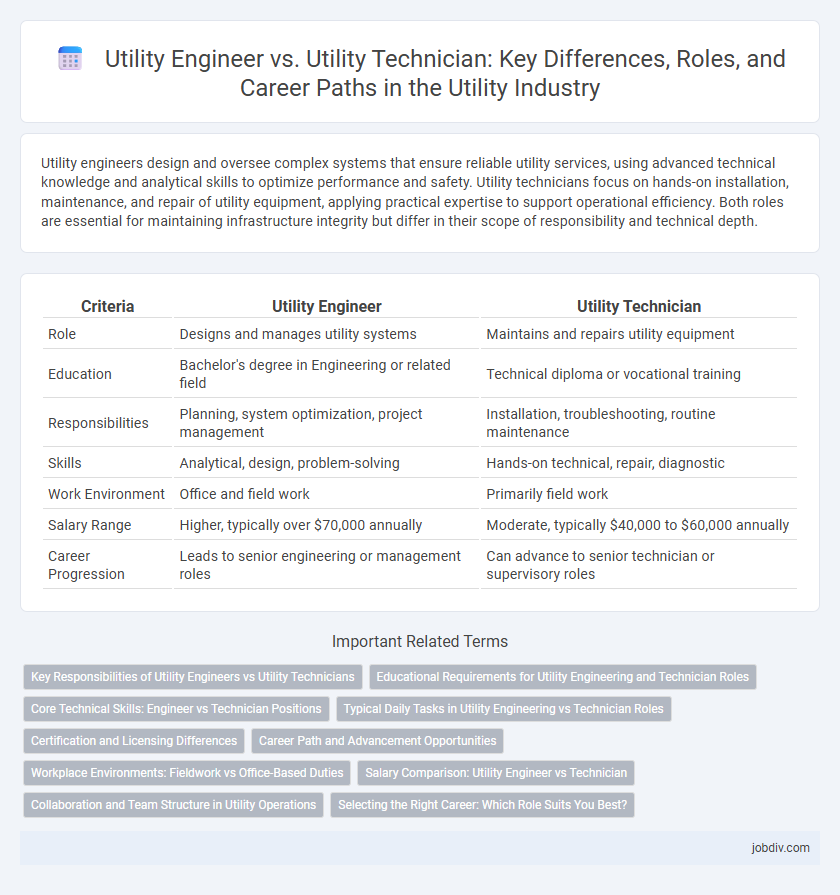Utility engineers design and oversee complex systems that ensure reliable utility services, using advanced technical knowledge and analytical skills to optimize performance and safety. Utility technicians focus on hands-on installation, maintenance, and repair of utility equipment, applying practical expertise to support operational efficiency. Both roles are essential for maintaining infrastructure integrity but differ in their scope of responsibility and technical depth.
Table of Comparison
| Criteria | Utility Engineer | Utility Technician |
|---|---|---|
| Role | Designs and manages utility systems | Maintains and repairs utility equipment |
| Education | Bachelor's degree in Engineering or related field | Technical diploma or vocational training |
| Responsibilities | Planning, system optimization, project management | Installation, troubleshooting, routine maintenance |
| Skills | Analytical, design, problem-solving | Hands-on technical, repair, diagnostic |
| Work Environment | Office and field work | Primarily field work |
| Salary Range | Higher, typically over $70,000 annually | Moderate, typically $40,000 to $60,000 annually |
| Career Progression | Leads to senior engineering or management roles | Can advance to senior technician or supervisory roles |
Key Responsibilities of Utility Engineers vs Utility Technicians
Utility Engineers are responsible for designing, planning, and overseeing the operation and maintenance of utility systems such as water, electricity, and gas distribution. Utility Technicians handle the hands-on installation, repair, and routine maintenance of these systems, ensuring continuous service and addressing technical issues on-site. While engineers focus on system optimization and compliance with regulations, technicians emphasize practical execution and troubleshooting.
Educational Requirements for Utility Engineering and Technician Roles
Utility engineers typically hold a bachelor's degree in electrical, mechanical, or civil engineering, emphasizing advanced coursework in systems design, energy management, and infrastructure development. Utility technicians usually require an associate degree or technical certification, focusing on hands-on training in equipment maintenance, system repair, and operational support. Employers prioritize formal engineering education for engineers to design and optimize utility systems, while technicians need practical skills verified through technical programs.
Core Technical Skills: Engineer vs Technician Positions
Utility Engineers typically possess advanced technical skills in system design, analysis, and optimization, leveraging expertise in electrical, mechanical, or civil engineering principles to develop and improve utility infrastructure. Utility Technicians focus on practical skills such as equipment installation, maintenance, troubleshooting, and repair, ensuring operational efficiency and safety in utility services. Engineers often engage in complex problem-solving and project management, while Technicians implement hands-on technical solutions under engineering guidance.
Typical Daily Tasks in Utility Engineering vs Technician Roles
Utility Engineers design and optimize complex systems for water, electricity, and gas distribution, conducting technical analysis, project planning, and system upgrades to enhance efficiency and reliability. Utility Technicians perform routine maintenance, equipment inspections, repairs, and monitor utility system operations to ensure continuous service and safety compliance. Engineers focus on strategic improvements and problem-solving, while technicians handle hands-on tasks and operational support within utility infrastructure.
Certification and Licensing Differences
Utility engineers typically require professional engineering licensure, such as the PE (Professional Engineer) license, which mandates a degree in engineering, passing the Fundamentals of Engineering exam, and several years of work experience. Utility technicians often hold industry-specific certifications, like the ETA (Electronics Technicians Association) certification or OSHA safety credentials, focusing on practical skills rather than formal engineering design. Licensing for engineers emphasizes advanced technical knowledge, design capabilities, and regulatory compliance, whereas certification for technicians centers on hands-on proficiency and safety procedures in utility maintenance and operations.
Career Path and Advancement Opportunities
Utility Engineers typically pursue advanced roles involving system design, project management, and strategic planning within utility companies, often requiring a bachelor's degree in engineering. Utility Technicians focus on hands-on maintenance, installation, and repair tasks, with career advancement through certifications and experience leading to senior technician or supervisory positions. Career progression for Utility Engineers generally leads to higher-level management or specialized technical expert roles, while Utility Technicians may advance to lead technician or operations coordinator roles.
Workplace Environments: Fieldwork vs Office-Based Duties
Utility engineers primarily work in office-based environments, designing systems, analyzing data, and managing projects through advanced software tools. Utility technicians focus on fieldwork, performing hands-on maintenance, repairs, and inspections of utility infrastructure such as electrical grids, water systems, and gas pipelines. The distinct workplace environments reflect their specialized roles, with engineers emphasizing planning and technical analysis, while technicians engage in operational and hands-on problem-solving tasks.
Salary Comparison: Utility Engineer vs Technician
Utility engineers typically earn higher salaries than utility technicians due to their advanced education, specialized skills, and greater responsibilities in designing and managing utility systems. On average, utility engineers in the United States earn between $75,000 and $110,000 annually, whereas utility technicians' salaries range from $45,000 to $65,000. The salary gap reflects the engineers' role in complex problem-solving and project oversight compared to the technicians' focus on maintenance and operational support.
Collaboration and Team Structure in Utility Operations
Utility Engineers and Utility Technicians collaborate closely within a utility operations team to ensure system reliability and efficiency. Engineers design, analyze, and optimize utility systems while Technicians handle installation, maintenance, and troubleshooting tasks, enabling seamless integration and performance. Effective communication and well-defined roles foster a cohesive team structure that enhances operational workflows and rapid issue resolution in utility management.
Selecting the Right Career: Which Role Suits You Best?
Utility engineers design and implement systems for water, gas, and electricity distribution, requiring advanced knowledge in engineering principles and project management. Utility technicians handle the installation, maintenance, and troubleshooting of utility infrastructure, emphasizing hands-on skills and technical problem-solving. Choosing between these careers depends on your interest in design and planning versus practical fieldwork and equipment maintenance.
Utility Engineer vs Utility Technician Infographic

 jobdiv.com
jobdiv.com